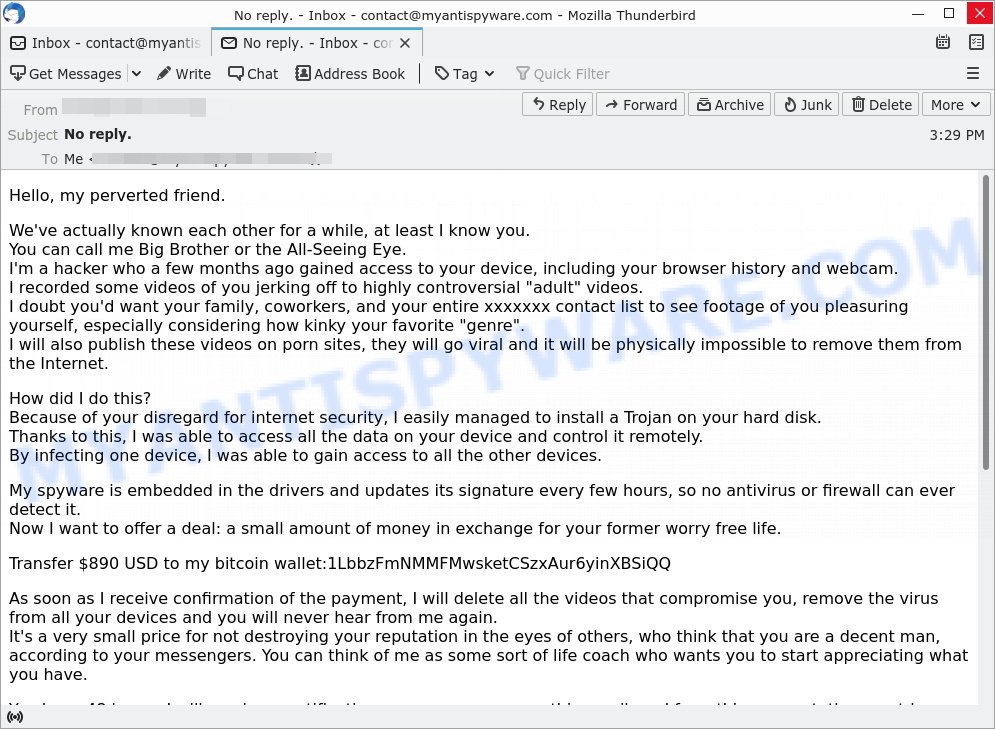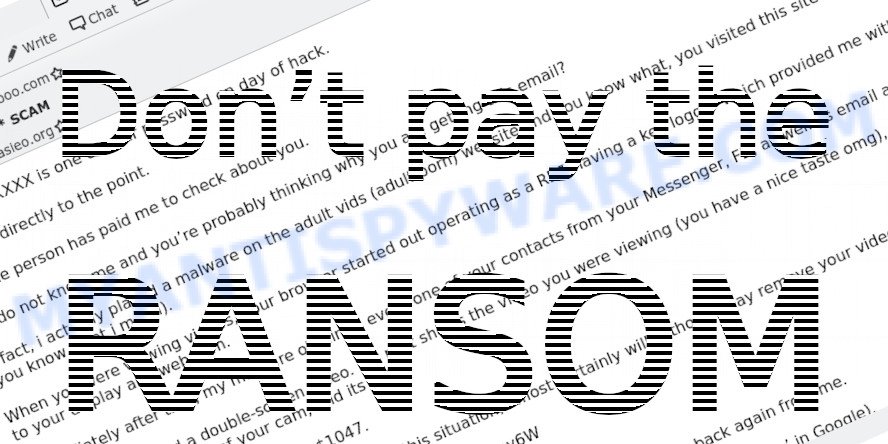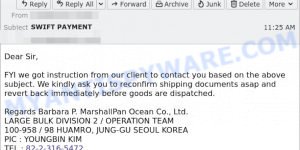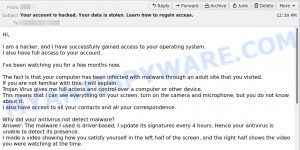A new version of a sextortion email scam has been spotted recently. This time, scammers are sending out emails with the subject ‘No Reply‘. These emails typically start with an unsettling line, “Hello, my perverted friend” which is a clear sign of the scam. The rest of the email usually follows the same old pattern: making threats to get money, asking for payment in Bitcoin.
This change in the email’s subject and opening line is a trick by the scammers to get past spam filters. As email systems get better at catching and blocking these scam emails, the scammers are constantly changing their tactics. They’re trying to make sure their emails don’t get automatically filtered out, reaching more potential victims.
Here’s an example of the “Hello My Perverted Friend” email scam:

Table of Contents
Is this a scam email?
YES. The “Hello My Perverted Friend” email is a classic example of an extortion scam. The sender is attempting to frighten you by claiming to have compromising videos and is demanding a ransom in Bitcoin to prevent the release of these videos. It’s important to note that this email is a hoax, and the sender doesn’t have any incriminating videos of you. There are several red flags that clearly indicate it’s a fraudulent attempt:
Red-Flags:
- Impersonal and Vague Threats: The email lacks specific information about you or the alleged videos. Scammers use vague and impersonal language that could apply to anyone.
- Use of Fear Tactics: The email instills fear by threatening to release compromising videos or information. These tactics aim to provoke an emotional, hurried response.
- Demand for Bitcoin Payment: Scammers often request payment in Bitcoin because it’s harder to trace and recover than traditional payment methods. Legitimate entities would not typically ask for payment in cryptocurrency, especially under such circumstances.
- Urgency and Deadlines: The email creates a false sense of urgency by giving a short deadline (like 48 hours) to pay. This pressure tactic is meant to rush you into making a decision without giving you time to think or consult others.
- Claims of Advanced Hacking Skills: The email boasts about sophisticated hacking techniques, such as installing a Trojan and gaining control over all your devices. These claims are often exaggerated or completely fabricated to make the threat seem more credible.
- Threats Against Seeking Help: Warning against contacting authorities or attempting to secure your devices is a tactic to prevent you from discovering that it’s a scam.
- Unverifiable Claims: The scammer’s claims are impossible for you to verify independently. Real hackers or blackmailers would provide concrete evidence to prove their claims.
- Anonymous Communication: The use of a temporary email account and the claim that the crypto address is untraceable are attempts to avoid detection and make it difficult for you to verify the legitimacy of the threat or seek help.
- Instructions Not to Respond or Reinstall Your System: The email advises you not to respond or try to reinstall your system, claiming that it would lead to the automatic release of the videos. This is meant to limit your options and make you feel trapped.
- Lack of Specific Personal Details: The email doesn’t address you by name or include specific personal details that a genuine hacker would likely have access to.
In summary, 🚫 If you encounter such emails, it’s crucial to remain calm and not engage with the sender. Remember, these are empty threats designed to exploit your fears. It’s always best to protect your online presence and be wary of such tactics. 🛡️ Always ensure the safety of your devices, change passwords regularly, and be cautious about sharing personal information online.
How the scam works
If you’ve ever received a worrying email and thought, “How did they get my email address?” the answer is often simpler than you’d expect. Scammers can easily find email addresses from data breaches, which are sometimes sold or shared in shady online forums. They send the same scary message to thousands of people, hoping a few will be frightened enough to react.
The vague but alarming threats in these emails are their main tactic. 🚫 They send out a lot of these emails, betting that some people might get scared because the content sounds believable, even if it’s very general. They don’t give specific details or proof, which makes you wonder if it might be true.
Then they make up a story about how they’ve hacked your computer. 🎭 They claim they’ve put some sort of spyware on your device and have embarrassing videos of you. But they never show any real proof that they actually have anything.
The last part of their scam is asking for a ransom. 💰 They usually want you to pay quickly and in Bitcoin, a digital currency that’s hard to trace. They set a short deadline to make you feel pressured and rushed into paying out of fear.
Here’s what the email said:
Hello, my perverted friend.
We’ve actually known each other for a while, at least I know you.
You can call me Big Brother or the All-Seeing Eye.
I’m a hacker who a few months ago gained access to your device, including your browser history and webcam.
I recorded some videos of you jerking off to highly controversial “adult” videos.
I doubt you’d want your family, coworkers, and your entire ******** contact list to see footage of you pleasuring yourself, especially considering how kinky your favorite “genre”.
I will also publish these videos on porn sites, they will go viral and it will be physically impossible to remove them from the Internet.How did I do this?
Because of your disregard for internet security, I easily managed to install a Trojan on your hard disk.
Thanks to this, I was able to access all the data on your device and control it remotely.
By infecting one device, I was able to gain access to all the other devices.My spyware is embedded in the drivers and updates its signature every few hours, so no antivirus or firewall can ever detect it.
Now I want to offer a deal: a small amount of money in exchange for your former worry free life.Transfer $890 USD to my bitcoin wallet:1LbbzFmNMMFMwsketCSzxAur6yinXBSiQQ
As soon as I receive confirmation of the payment, I will delete all the videos that compromise you, remove the virus from all your devices and you will never hear from me again.
It’s a very small price for not destroying your reputation in the eyes of others, who think that you are a decent man, according to your messengers. You can think of me as some sort of life coach who wants you to start appreciating what you have.You have 48 hours. I will receive a notification as soon as you open this email, and from this moment, the countdown will begin.
If you’ve never dealt with cryptocurrency before, it’s very easy. Simply type “cryptocurrency exchange” into a search engine, and then all set.Here’s what you shouldn’t do:
– Don’t reply to my email. It was sent from a temporary email account.
– Don’t call the police. Remember, I have access to all your devices, and as soon as I notice such activity, it will automatically lead to the publishing of all the videos.
– Don’t try to reinstall your system or reset your device. First of all, I already have the videos, and secondly, as I said, I have remote access to all your devices, and once I notice such an attempt, you know what happens.Remember, crypto addresses are anonymous, so you won’t be able to track down my wallet.
So long story short, let’s resolve this situation with a benefit for me and you.
I always keep my word unless someone tries to trick me.Lastly, a little advice for the future. Start taking your online security more seriously.
Change your passwords regularly and set up multi-factor authentication on all your accounts.
Basically, this scam is all about making you feel scared and rushed. If you get an email like this, don’t talk to the person who sent it and don’t send any money. Just delete the email and let the right people know about it. Also, make sure your computer has good anti-virus software and use different, strong passwords for your accounts to help stop these kinds of scams from working.
Examples of such scams
The “Hello My Perverted Friend” email scam is just one of the many deceptive schemes that prey on individuals’ fears and exploit their privacy concerns. Unfortunately, this type of scam is not unique, and there are various similar scams circulating online.
By examining these examples, you can better recognize the warning signs and arm yurself with knowledge to avoid becoming victims of fraudulent schemes. Take a closer look at the following scams: I RECORDED YOU Email Scam, Your Private Information has been Stolen Email Scam, and I am a professional hacker EMAIL SCAM and let’s learn how to safeguard ourselves from their deceitful tactics. Remember, knowledge is power.
- Reconfirm Shipping Documents Scam email
- Cash Settlement Awarded Email Scam
- Financial Assistance Department Email Scam
- Geek Squad Email Scam (May 2023)
- Your account is hacked. Your data is stolen. Email Scam
Should you pay?
No, you should not pay the ransom demanded by the scammer. Remember that this is a scam and paying the ransom will only encourage the scammer to continue their criminal activities! Additionally, paying the ransom can make you a target for future scams. It is important to stay vigilant and protect your personal information from such scams by using strong and unique passwords, enabling two-factor authentication, and regularly updating your computer’s security software. If you receive such an email, it is best to report it to the authorities and your email provider.

What to Do if You Receive the Email
Receiving the “Hello My Perverted Friend” email can be deeply unsettling, but with the right steps, you can ensure safety and peace of mind.

Here’s a specific guide on handling this scam:
Begin by reminding yourself to stay calm. The email is crafted to elicit panic, pushing recipients into rash decisions. Recognize its true nature—a manipulative attempt to exploit fear.
Resist any impulses to pay. Even if you’re tempted to make the problem go away, understand that payment doesn’t guarantee safety. It merely emboldens the scammer, possibly marking you as an easy target for future deceptions.
Do not engage with the scammer. Replying or trying to open a dialogue can inadvertently give away more information, or signal that your email is active, making you a prime candidate for further scams.
Seeing a familiar password can be particularly jarring. If the scam email mentions a password you recognize, it’s essential to check its source. Use services like haveibeenpwned.com to see if your email or credentials have been compromised in any past data breaches.
Subsequent to that, update your passwords. Always choose strong, unique combinations and activate two-factor authentication on platforms that support it.
As a precaution, run a comprehensive security scan on your device. While the scam email’s claims about malware are usually baseless, this step ensures your system remains clean and threat-free.
Report the email to relevant authorities (e.g., FTC). Sharing details with your local law enforcement or cybercrime units can contribute to ongoing investigations and aid in the crackdown on such malicious activities.
Lastly, spread awareness. Inform friends, colleagues, and family about the scam, equipping them with the knowledge to recognize and sidestep such threats. Knowledge, shared and acted upon, diminishes the effectiveness of these scams, making the digital world a bit safer for everyone.
Threat Summary
| Name | ‘Hello My Perverted Friend’ |
| Type | Phishing/Sextortion |
| Ransom amount | $890 USD (in Bitcoin equivalent) |
| Bitcoin Address | 1FuhTuHth4r9XKFuXudigNYsrN3nMPnG8w, 13BfNz9CsS9YHDs2UeDkH6m7rZDM4Xo81u, 1LbbzFmNMMFMwsketCSzxAur6yinXBSiQQ |
| Fake Claims | Compromised data, webcam access, malware/backdoor installed |
| Damage | Psychological distress, potential financial loss if ransom is paid |
| Distribution | Mass emailing, likely from a purchased or hacked email list |
| Tactics | Fear induction, urgency, deception |
| Variations | Different ransom amounts, varying email content, alternative cryptocurrencies for payment |
| Prevention Tips | Use strong, unique passwords; enable two-factor authentication; be skeptical of unsolicited emails; never pay ransoms |
| Reporting Info | Forward to the Anti-Phishing Working Group at reportphishing@apwg.org; Report the scam to relevant authorities (e.g., FTC); Share information about the scam with friends and family to raise awareness; Monitor online accounts for any suspicious activity |
Conclusion
In conclusion, the “Hello, my perverted friend” email is a classic example of a sextortion scam, designed to exploit fears and extort money. These emails use frightening claims and demand payment, often in Bitcoin, under the guise of protecting your reputation. Remember, these threats are baseless, crafted to trigger a panicked response. It’s crucial not to engage with the sender, not to pay any ransom, and to report the email to the appropriate authorities. Protect yourself by ensuring your computer’s security is up to date and using strong, unique passwords for your accounts. Awareness and caution are your best defenses against these types of scams. Stay informed, stay skeptical, and stay safe.






















